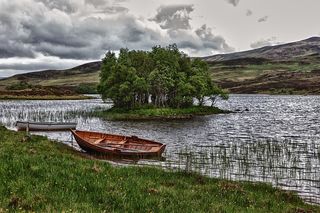Environment
Are North Americans Vacation-Deprived?
How nature can help us to find balance.
Posted August 6, 2019 Reviewed by Lybi Ma

A number of years ago, Gitte and I organized a conference with the theme of “Re-filling the Empty Well,” which was directed at those who work in the caring professions such as nursing and social work.
These fields are well-known for their high burnout rates and the problem of “compassion fatigue.” Over the two days, lectures were given on self-care alongside simple restorative yoga practices.
While the importance of learning techniques for dealing with stress is particularly heightened within some professions, it is also clear that many of us are struggling with the ability to cope with the various pressures of life. Rising rates of anxiety, depression, addiction, and insomnia tell the story.
If we don’t have healthy coping mechanisms then we will turn to whatever works and gets us through the day (and night). Caught up in the rush that is both self-created and often imposed from the outside, it can seem almost impossible to lead a balanced life that allows for self-reflection and recharging.
Gitte and I have been aware over the years that we do not want to be hypocrites and have made determined efforts to practice what we preach. This is always a challenge and I realized recently I was thinking about how I was going to cram mindfulness classes into my busy fall schedule. I had a sudden picture of myself rushing breathlessly to mindfulness class and was brought up short at the ridiculousness of the picture.
Both of us have found that the nature of our work is often intense, followed by more open periods of time. As a result, during busy times, it is often challenging to maintain healthy routines. In Gitte’s case, a heavy travel schedule complicates the picture further. We have discussed, then, the ways in which each individual has to adapt their self-care routines to the shape of their own lives. When things are extremely busy, this may simply mean ensuring you stake out a healthy restaurant and put your legs up the wall at the end of the day.
Also, the rhythms of nature offer support and guidance. The Ayurvedic tradition emphasizes that we need to align ourselves with the natural world and the climate in which we live and with a little attention this can be simple to do. In the case of Gitte and I, we live in the Northeast where we have cold winters and hot summers, with the days being short and dark by December.
When I began to think about it, I realized that as a child we would generally (like many Canadians) take our holidays in July. We would head up north and go camping or stay in cabins. The days were spent mostly in or by the water.
Then, for the many years living in the city, when heading north was not possible, there were glasses of white wine on patios and balconies on warm summer evenings. This is such a common pattern that I didn’t think much of it, but now realize the wisdom of this approach. The heat makes living inside challenging and energy levels naturally drop in this kind of weather. Similarly, in many European countries, people take over a month of holidays in the summer and head out of the cities.
Over the years, Gitte and I have recapitulated this pattern when working on writing projects in the summer. We work during the day, perhaps do some yoga, go for a swim and then have a nice dinner. In this way, we are trying to integrate life and work in a way that is pleasurable and linked to the patterns of nature.
How this works will look different depending on the individual situation. But anyone anywhere can begin to pay attention to the ways in which their bodies and minds respond to being in nature and simple, healthy routines. Another important part of this conversation is the need to take time away from work.
According to research, four out of 10 Americans do not take their allotted holidays and 25 percent receive no paid leave (BBC News, 2015). This is a complex issue and there are clearly many reasons why this may be the case. But whatever the reason, it is clear that there is a “vacation problem.” North Americans are far more vacation-deprived than their European counterparts, where there tend to be many more religious holidays and paid leaves.
While Canadians do take more holidays than Americans, they share the same work-focused, work-pressured approach to life. Interestingly, one approach being taken up by millennials is the “micro-break,” using a vacation day to create long weekends throughout the year (Expedia 2018). I have spoken to a number of people who use this approach and find that it works very well. Often three days off is all that is needed to recharge.
The nuanced nature of these issues is important to note. Our first blog was on the topic of the loss of the inner life. Lack of free time and exhaustion is clearly a contributor to this problem. The solutions will include progressive labour laws and government action. In 2007, Ontario added another statutory holiday called “Family Day” in the month of February in recognition that Ontarians were vacation-deprived in the winter months.
And while government action is important, it is just as important that there is a change in attitude. Many companies are now realizing the counterproductive nature of having over-worked, stressed employees. Many of us pride ourselves on being “crazy busy,” as this proves that we are productive members of society.
But in fact, we will have trouble fulfilling our various roles unless we respect the need for rest, relaxation, and self-reflection. On that note, we wish everyone a restful summer spent in ways that are most nourishing and inspiring for you.
References
“Why do Americans not take their holiday time? BBC News, July 27, 2015, https://www.bbc.com/news/av/world-us-canada-33682547/why-do-americans-n…
“A Micro-break is Canada’s Answer to Vacation Deprivation,” Expedia, October 16, 2018. https://finance.yahoo.com/news/micro-break-canadas-answer-vacation-1211…




